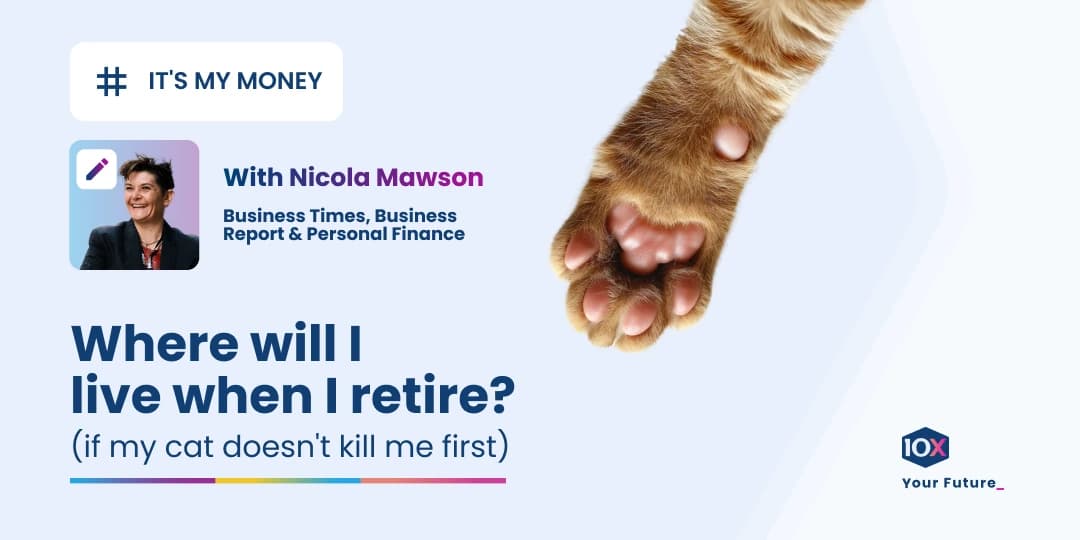Where am I going to live in retirement (if my cat doesn’t kill me first)?
18 February 2025
The views and opinions expressed in this article are those of the author and do not necessarily reflect the official policy or position of 10X Investments.

When my divorce came through, I bought myself a neat, if rather small, little duplex. I’d always wanted a duplex. And then I swore I would never move again. Ever. It’s painful. I didn’t have space for boxes to be stored, given that my parking isn’t in a garage, but under a carport. And I needed to unpack fairly quickly - hundreds of books don’t survive well in the wild.
I bought just more than a decade ago. As a result, the good news is that I’m just over half of the way through paying off my bond. The bad news is that it was a decade ago and, well, my body swears at me, sometimes loudly, when I climb those stairs.
As I get closer to retirement, the two big questions of where my income will come from and where I’ll be living have firmly perched themselves in the back of my mind. In terms of finances, as I’ve written elsewhere, I’m leaning towards a living annuity (and I’ve been fortunate to have some very good chats with some very smart investment consultants about it), but in terms of where to live… well, I need to face the reality of a house that’s all on one level and doesn’t have stairs with shadowy places where the cat can hide when she tries to kill me.
Plan for a comfortable retirement with our
Living Annuity calculatorThere are a few options worth pondering, each of which comes with the usual pros and cons. And a big consideration is cost - as it always is. As a result, I need to look very carefully at my options, and how they might fit into my financial position in approximately 20 years. Here are some of those options.
Options for retirement living:
Independent living units: Homes or apartments that stand alone but are located in a retirement village. This provides security as well as a sense of community because there will be activities to do. The most typical activity seems to be bingo, although I can see myself starting a darts club (personal injury disclaimers mandatory). Or maybe insisting on pool tables?
Assisted living facilities: This is similar to an independent unit but comes with services provided by the management of the village, such as meals in a canteen, housekeeping, or personal care where needed.
Frail care: As much as I really don’t want to imagine myself in a situation where I need around-the-clock care, it needs to factored into my thinking because I’m not bullet proof. I’ve got to remind myself that these aren’t just for people who battle significant health challenges, but also for someone who is recovering from surgery (note to self: what might medical aid contribute here?)
Types of ownership:
Sectional title: These are no different to other sectional title units such as townhouses in the way they work, with owners making up the body corporate, and the complex being run by a managing agent directed by trustees.
There is, however, quite a lot to think about here. I wouldn’t want a complex filled with boring people (or people who sweat the small stuff). Yet I wouldn’t want to be surrounded by endless noise. If I owned, would I be willing to be a trustee? Would the chairman position be held by someone who thinks everyone’s business is their business?
Share block scheme: I didn’t know about this before I started researching this article. It’s certainly an interesting option. It’s like buying shares in a company and then owning part of that company, except you then have the right to live in a space and use common areas.
While I wouldn’t own the space, I would still own the shares, and these can be transferred without the usual rigmarole involved with selling property (the village is administered as if it were a company, and not a property). One advantage seems to be affordability.
However, I wouldn’t go into this lightly. I’d have to get a lawyer, and an accountant, have a good look at the books and such because the last thing I would want is for the company to go belly up and my shares become worthless (worth noting that I should probably also look at the books of any sectional title options, too). Everything would also have to be in accordance with the Companies Act.
Life rights: This is similar to a share block scheme in that you would buy the ‘right’ to live in the unit from when you retire until when you pass away peacefully in your sleep or your cat murders you. However, the property will never be mine and can’t be bequeathed to my heirs.
When it’s time for me to retire (by which stage I should not have any money outstanding on either a bond or a car), I’ll already need to have a plan in place for somewhere to move to. I’ll need to ensure that I can afford the type of solution that suits me while also considering location, healthcare services if I slip and fall, as well as the community and available activities.
That is, unless the cat is successful, in which case I don’t need to worry about a retirement home, but rather a wooden box or cremation. Come to think of it, funeral insurance is yet another thing I need to consider in my financial planning.
Life is full of unknowns. The only things that are certain are, as Benjamin Franklin said, death and taxes.
Also, what am I going to do with my 700 books?
9 out of 10 people do better with 10X
Related articles
How can we 10X Your Future?
Begin your journey to a secure future with 10X Investments. Explore our range of retirement products designed to help you grow your wealth and achieve financial success.


